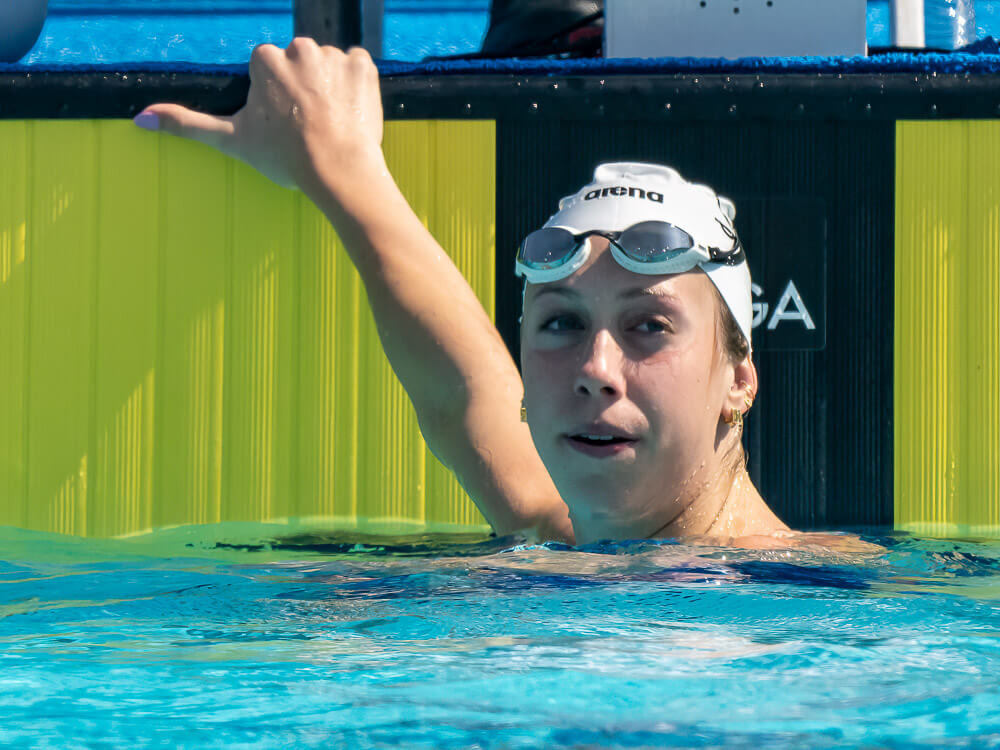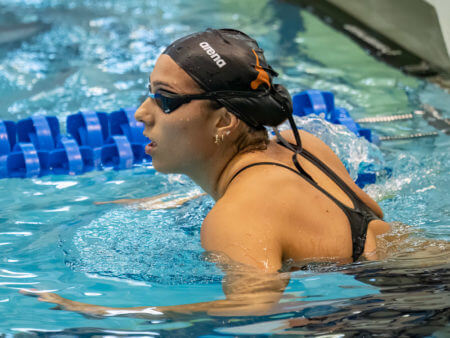Gretchen Walsh, Minna Abraham Setting the Pace in Intriguing Collegiate 200 Freestyle

Gretchen Walsh, Minna Abraham Setting the Pace in Intriguing Collegiate 200 Freestyle
An impressive collection of swimmers have headlines the final of the 200-yard freestyle at the NCAA Women’s Championships over the years. Back in 2017, the field included four women who had won or would win individual Olympic medals, Katie Ledecky, Simone Manuel and Leah Smith having already done so while Siobhan Haughey had yet to become an international star. Two others in that race would represent the U.S. at the World Championships, Gabby Deloof and the swimmer who would tie Ledecky for the win, Mallory Comerford.
Seven seasons later, the collegiate landscape in the women’s 200 free has become… confusing. In long course, the Americans remain one of the top-two teams in the world in the 800 free relay, but only one of the seven swimmers who was part of this year’s relay was a current college swimmer, Indiana’s Anna Peplowski.
Two of the three finals swimmers from this year’s relay finals squad at Worlds, Bella Sims and Erin Gemmell, have started their college careers this year, but neither is a lock to contend for the NCAA title in the event. Sims might not even swim the 200 free at the national championship meet because she is the fourth-fastest swimmer ever in the 400 IM (3:56.59), and those two events fall on the same day at NCAAs. Gemmell, meanwhile, is not as strong short course as long course.
The winner at last year’s national title was Stanford senior Taylor Ruck, but her time of 1:42.36 was more than one second slower than her winning time from 2022. Four others broke 1:43 in that final: Tennessee sophomore Brooklyn Douthwright and a pair of freshmen, Virginia’s Aimee Canny and Stanford’s Kayla Wilson.

Texas fifth-year Kelly Pash — Photo Courtesy: Peter H. Bick
So far in the 2023-24 season, five swimmers have cracked 1:43, some of them expected but others not so much. Texas’ Kelly Pash, third in the event two years ago, owns a season best of 1:42.64, followed by Canny (1:42.93) and Peplowski (1:42.97), with Gemmell right behind 1:43.09. Sitting at 1:43.21 are Wilson and the swimmer who placed second to Ruck two years ago, Isabel Ivey. Ivey, who has transferred from Cal to Florida, entered the season with the second-quickest career best of any current college swimmer at 1:41.35, behind only Sims’ 1:40.84.
But over the weekend, two others jumped into national contention with a pair of 1:41s of their own. First up was Gretchen Walsh, whose performance at the Tennessee Invite included the fastest times ever in the 50 free and 100 butterfly plus the quickest 100 free relay split ever. Walsh, who swam a best time of 1:43.24 last year, crushed a time of 1:41.32 while dominating a field that included Canny and older sister Alex Walsh.
Gretchen would become a surefire title contender in the 200 free except for the fact that she almost surely will not compete in the event in March. Instead, her Friday at the NCAA Championships will surely include either the 100 fly or 100 backstroke, where she is the defending NCAA champion and fastest swimmer ever. Walsh is unlikely to even race the 200 free on a relay given her important contributions to the Cavaliers’ four sprint relays.
The other newcomer to the 200 free landscape is Minna Abraham, a newcomer from Hungary who won silver medals in the 200-meter free and both individual medley events at last year’s World Junior Championships. Racing Gemmell and Wilson at the Texas Invite, Abraham was dominant, beating the field by 1.71 seconds. Her final time of 1:41.38 was just behind Walsh’s time and good enough to make her the 13th-fastest performer in history.
Now, each of these swimmers could be a factor in perhaps the most open event of the NCAA Championships. As of right now, with most teams done with short course racing for the fall semester, the national favorite would be Sims, if she swims the race. If not Sims, perhaps Walsh, but her participation is even less likely. Maybe it’s Abraham who shows off quick mastery of a short course yards format she never raced before this season. Maybe Gemmell can bring her short course swimming up to her impressive long course results. Maybe Ivey rebounds to the level she showed two seasons ago. Douthwright has yet to record any swift times this season, but she will surely be a factor as well.
Perhaps this race currently lacks the names of years past, when the 200 free provided a meeting point for wide-ranging skill sets, with the 50-yard national champion facing off with the best distance swimmer ever plus plenty of other standouts in between. Nonetheless, plenty of storylines to track here over the next four months leading into the NCAA Championships.



